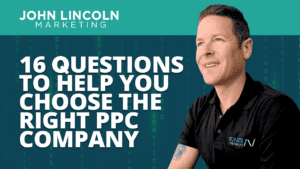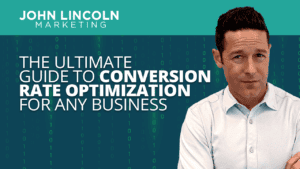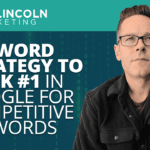
Top 16 Questions to Ask a PPC Company in 2024
In 2024, choosing the right PPC company is not just about spending your advertising budget. You want to make every cent count towards your business
If you’ve got a great customer relationship management (CRM) system, then it probably gives you the option to use lead scoring.
But what is lead scoring, exactly?
And how can it help your business?
Those are just a couple of the questions that I’ll answer in this article.
Lead scoring is a way to prioritize contacts.
There are many ways that your marketing and sales teams reach people. In some cases, folks will fill out an online form to learn more about what you’re offering. In other cases, contacts will respond favorably to a cold call.
All of that effort gives you a catalog of candidates who might become customers.
But some candidates are more likely to become customers than others.
That’s why you need lead scoring. It helps you identify which of your contacts are “hot” and which are “not.”
So where are you at right now?
Are you handling countless leads manually? Do you find that you’re spending way too much time on contacts who never become customers? Do you have plenty of marketing campaigns that provide contacts but you don’t know how to prioritize them?
If the answer to any of those questions is “yes,” then you already know the importance of lead scoring. It’s a business process that will save you time and money.
For starters, it saves you money by lowering your acquisition costs.
Remember, one of the most important questions you can answer in business is: how much does it cost to acquire one customer?
Once you’ve answered that, it’s your job to reduce that cost. As much as possible.
Lead scoring will help you do that by enabling your team to invest their time more wisely.
Additionally, lead scoring also helps you put in place a system that optimizes your sales and marketing workflows.
For example, your sales team might only reach out to contacts with a minimum score of 40. Contacts who fall under that score will go through a lead nurturing process via email marketing.
And when some of those folks get nurtured into a higher score, sales reps can contact them.
Finally, lead scoring also enables you to maximize your top line revenue. That’s because your team will focus on contacting people who will open their wallets.
As the name implies, lead scoring is often measured with a number. The higher the number, the more likely the contact will turn into a customer.
But how do you keep score?
By following how the contact engages with your business. Whenever the contact hits a marketing channel, the score increases.
However, some channels are more valuable than others.
For example, if somebody calls your business out of the blue and says, “I really want to buy this product you’re selling,” that’s an engagement that’s worth a whole lot of points.
You might give that person 50 points towards the lead score.
On the other hand, if somebody says “Yeah, I might be interested” in response to a cold call, that’s worth far less.
You might give that person 10 points towards the lead score.
There are plenty of other types of engagements as well, including:
And more.
It’s up to you to determine how much each engagement is worth. However, in some cases, your CRM might already use its own scoring system.
You can also subtract points to a lead’s score based on behavior. For example, you might take points away from people who unsubscribe to your email list.
By the way, the kind of lead scoring I’m describing here is called implicit lead scoring. It’s behavior-based.
Explicit lead scoring, on the other hand, is based on demographic and company data. For example:
Why is that important? Because, for example, your business might serve a specific industry. And contacts outside of that industry wouldn’t receive high scores.
If you’re in the food service business and primarily sell to restaurants, a lead who doesn’t work for a restaurant will likely have a low score.
If you’re starting lead scoring from scratch, you might wonder: “How do I get this ball rolling?”
Some companies predict the future by looking at the past.
They’ll take a look at common traits of contacts who ended up becoming customers. Then, they’ll build a scoring system with that info.
You can do that as well.
For example, let’s say you notice that people who clicked on a link in an email that offered a discount became customers 37% of the time. That’s a great ratio.
So, in the future, you’d give those people a nice bump up in their lead scores.
Do that kind of research for both implicit and explicit scores. You’ll come up with a winning formula.
Now, let’s take a look at the different phases of lead scoring.
Marketers use these five phases to identify where contacts/leads are in the sales journey:
Let’s say you’re running a business that offers multiple products or services. Somebody might become a customer for one product but not any of the others.
But that doesn’t mean that the person doesn’t want to buy one of your other products.
In fact, people who bought one product from you might be happy to buy another product if they’re satisfied with what they got the first time.
The point is: you need a system that qualifies people on a per-product basis. The way to do that is with tagging.
What is tagging? It’s a nifty little feature your CRM provides that lets you know which product the person purchased.
Let’s say you’re selling restaurant supplies and a lead purchased food-grade containers. In that case, you’d create a digital tag in your CRM called “Food Grade Containers.” Then add that tag to the person’s record.
But that same person hasn’t yet purchased a meat slicer. And your sales team thinks he might need one.
So you go through the whole lead scoring process again for selling that person a meat slicer. And you would tag the record with “Meat Slicer.”
When it comes to digital marketing, the name of the game is automation. It’s best to automate as many routine and number-crunching tasks as possible.
That’s true with lead scoring as well.
The good news is if you’re using a quality CRM, then you’ve probably got a lead scoring system in place already. Now it’s time to use it.
However, if you’re brand new to this digital marketing thing, then you might not even have a CRM yet. In that case, you’ll want to get one with lead scoring.
Here are a few options:
There are plenty of other options on the market as well. Feel free to do some online research.
Wrapping It Up
There you have it: a complete guide to lead scoring.
Now that you know the basics, fire up your CRM and see what it offers. Then, start using lead scoring to boost your bottom line.
Welcome to John Lincoln’s personal website. You can learn about John Lincoln’s books, films, book him to speak and contact him. John is directly associated with many of the businesses mentioned on this website and freely discloses this information.

John Lincoln is CEO of Ignite Visibility, one of the top digital marketing agencies in the nation. Ignite Visibility is a 6x Inc. 5,000 company. Ignite Visibility offers a unique digital marketing program tied directly to ROI with a focus on using SEO, social media, paid media, CRO, email and PR to achieve results. Outside of Ignite Visibility, Lincoln is a frequent speaker and author of the books Advolution, Digital Influencer and The Forecaster Method. Lincoln is consistently named one of the top digital marketers in the industry and was the recipient of the coveted Search Engine Land “Search Marketer of The Year” award. Lincoln has taught digital marketing and Web Analytics at the University of California San Diego since 2010, has been named as one of San Diego’s most admired CEO’s and a top business leader under 40. Lincoln has also made “SEO: The Movie” and “Social Media Marketing: The Movie.” His business mission is to help others through digital marketing.
Want to get in touch with John Lincoln? Click Here To Reach Out.

In 2024, choosing the right PPC company is not just about spending your advertising budget. You want to make every cent count towards your business

Whether you’re a seasoned marketer or just starting out, conversion rate optimization (CRO) is a powerful tool that can boost your sales, leads, and overall

Feeling overwhelmed by the sea of SEO companies out there? You’re not alone! Choosing the right partner is crucial for achieving your online marketing
 Keyword Strategy to Rank #1 in Google for Competitive Keywords
Keyword Strategy to Rank #1 in Google for Competitive Keywords If you're asking yourself, "How do I identify competitive keywords?" you've come to the right place. To fully dive into this